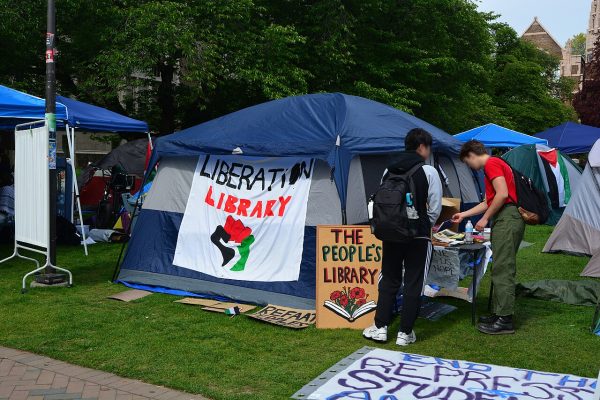Many of the schools in Gaza are now in ruins, used as places to station Israeli soldiers or turned into shelters for internally displaced Palestinians. The damage the education system has suffered is beyond imagination. There has been almost a total destruction of educational institutions in Gaza, with 90% of the schools destroyed or damaged to varying degrees and about 100 scholars have been killed, as have some 5,500 students. Healing and reconstructing the systems of education in Gaza will take years.
Only sustained and collective efforts by those who care about education in Palestine can provide remedies to this catastrophe. These might include providing scholarships for students from Gaza, allowing exchange visits with universities in Gaza and giving students in Gaza access to online libraries, as well as sending university professors to teach in Gaza to break the intellectual siege. Such interventions would only be successful if the full context of the recent destruction — Israel’s decades-long siege and system of control which had already long exhausted the education system, students and staff — is considered in rebuilding efforts.
There is no doubt that student encampments around the world were inspired by the resilience of the people of Gaza, including students, teachers and staff, and in reaction to the killing of so many of them. These encampments have provided messages of hope to the people of Gaza who have been following them as Israeli bombs fall. Some Palestinians in Gaza wrote statements of support and appreciation for the student encampments on their tents after being displaced by the Israeli army, thanking them for their solidarity.
In fact, student encampments and campus occupations have honored the memories of Palestinian victims in Gaza in many ways, including by renaming a hall at Colombia University as Hind’s Hall (named after six-year-old Hind Rajab, who was killed in late January), and naming makeshift libraries after Alareer (where Haymarket Books has often supplied the volumes and continues to “offer free books to Gaza solidarity encampments on campuses across the country).
The message behind these actions is clear: We hear the pain of students and educators in Gaza and we will let our campuses know about them, too, so that their death and starvation comes to an end.
The Debt Collective, an organization in the United States that focuses on the ways debt and racial capitalism impact our lives and feed so many types of oppression, is holding a rally and action in Washington D.C. on May 22 that calls on President Joe Biden’s administration to “fund education, not genocide,” a direct reference to the U.S. government’s continuing military aid to Israel.
These U.S. weapons that have been given to Israel — and continue to be provided — were used to destroy schools and other infrastructure and systems of education in Gaza. Protesters in Washington D.C. on Wednesday will be calling on the Biden administration to abolish student debts in the United States instead of sending billions of dollars to Israel, which it uses to kill Palestinian educators and students as well as to destroy Gaza’s schools.
The Debt Collective’s message is clear: invest in education, not wars.
It bears repeating that Israel has not only attacked schools and the infrastructures of teaching and learning in Gaza, but it has also killed 94 university professors, many of whom had advanced degrees in their fields, and targeted Israeli missile attacks killed three university presidents in Gaza, alongside their families. These actions along with many others have prompted the use of the terms “educide” and “scholasticide” to describe Israel’s assassinations of scholars and the destruction of the education system.
According to the Palestinian Ministry of Education and Higher Education, as of April 2024, the Israeli military had killed 261 teachers and 5,479 students in Gaza. This adds to the larger attacks on education that hare happening across the globe, as police attack students and their encampments, sacking them and hauling off many to jail. These attacks on the student movements may translate into more censorship, at least in the short term, where students and staff will have fewer spaces to express their opinions and speak truth to power.
The attacks on the Palestinian systems of education by Israel cannot be separated from the widespread censorship and the global attack on student movements and encampments in solidarity with Gaza.
DOCUMENTED DESTRUCTION
Before October 7, some 625,000 students attended 813 schools run by 22,000 teachers in 563 school buildings in Gaza, according to the Global Education Cluster (EC). Some of the schools had so many students enrolled that they operated two shifts.
But now, some 90% of all schools in Gaza have either been completely destroyed or sustained various degrees of damage. All six major universities in Gaza, including the Islamic University of Gaza that was founded in 1978, have been leveled by Israeli airstrikes.
